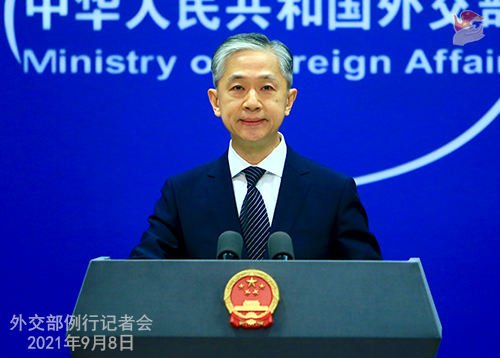
CCTV: The African Products Online Promoting Season of the Forum on China–Africa Cooperation (FOCAC) was officially launched on September 6. We've noticed many activities jointly held by China and Africa recently. Could you give us a brief description of those?
Wang Wenbin: Just as you said, the three-month-long African Products Online Promoting Season of FOCAC officially kicked off on September 6. This is a concrete measure taken by China to translate the vision of the China-Africa digital innovation partnership plan into reality, which has been warmly received and actively participated by African countries. Recently the two sides have jointly held the China-Africa Internet Development and Cooperation Forum and the launching ceremony for the Report on Chinese Investment in Africa. Going forward, there will be the second China-Africa Economic and Trade Expo, the China-Africa Beidou Cooperation Forum, among other events. Focusing on various sectors including science and technology, innovation and investment, these events aim to meet Africa's needs for cooperation and development and help revitalize its economy. They fully demonstrate China's firm confidence and resolve to promote the transformation and upgrading of China-Africa cooperation and realize high-quality development.
China and Africa have always been good partners on the path to common development. China has been Africa's largest trading partner for 12 consecutive years. Two-way trade between January and July this year reached $139.1 billion, up by 40.5% year-on-year, registering a record high. Over the same period, China's direct investment in Africa across all sectors stood at $2.07 billion, higher than the pre-COVID-19 level in 2019. At the 2018 FOCAC Beijing Summit, President Xi Jinping announced eight major initiatives towards building a closer China-Africa community with a shared future. Three years on, the two sides have worked hand-in-hand and realized high-quality implementation of the eight initiatives despite the difficulties posed by COVID-19. A large number of cooperation projects have taken root, delivering benefits to the Chinese and African people and bolstering Africa's economic recovery.
The FOCAC Dakar Summit will be held as scheduled in the fourth quarter this year. We will uphold the FOCAC spirit of wide consultation, joint contribution and shared benefits, proceed from the realities of China and Africa, jointly draw the blueprint for China-Africa cooperation in the next three and more years, and continue enriching and updating the China-Africa community with a shared future.
Shenzhen TV: Some in the US reportedly said that more robust market regulation measures by the Chinese government may heighten market risks. Do you have any comment?
Wang Wenbin: The Chinese government has stepped up anti-monopoly regulation and cracked down on unfair competition behaviors to uphold the order of fair competition. Based on laws and precedents, such efforts are the common practice of managing economic activities in many countries. This will fundamentally promote fair, orderly and sustainable growth and development of the Chinese economy, and will be good for the world economy in the long run. Chinese and foreign investors, business operators and consumers will eventually benefit from it. More and more international organizations and people from the economic community have said that they understand why these measures need to be taken and expressed their support.
Opening-up is China's basic national policy that will never waver. As a matter of fact, China is making ever greater strides in opening-up at a high level. Recently, President Xi Jinping announced that China will implement across the country a negative list for cross-border trade in services and support Beijing and other localities in piloting the alignment of domestic rules with high-standard international free trade agreements. The State Council issued measures to promote trade and investment facilitation and deepen reform and innovation in pilot free trade zones (FTZs), in an effort to enable trade, investment, international logistics and the financial sector to better serve the real economy. The general plan for building a Guangdong-Macao in-depth cooperation zone in Hengqin and the plan to comprehensively deepen reform and opening-up of the Qianhai Shenzhen-Hong Kong Modern Service Industry Cooperation Zone were released, setting new goals for developing new institutions for high-level opening-up and better business environment.
I'd like to stress that China will, as always, provide better safeguards for foreign investors to do business in China. We will work with other parties to uphold openness and cooperation for mutual benefit, share development opportunities and jointly promote world economic recovery and growth.

Kyodo News: According to reports, the Afghan Taliban has announced the formation of a new government. Does the Chinese side have any comment?
Wang Wenbin: China attaches importance to the Afghan Taliban's announcement of the formation of an interim government and some key roles. This has put an end to the anarchy in Afghanistan that lasted for over three weeks, and is a necessary step for Afghanistan to restore domestic order and pursue post-war reconstruction. We noticed that the Afghan Taliban said that the interim government is formed to restore social and economic order as soon as possible.
China's position on the Afghan issue is consistent and clear. We always respect the sovereignty, independence and territorial integrity of Afghanistan, adhere to non-interference in Afghanistan's internal affairs, and support the Afghan people in independently choosing a development path suited to the country's conditions. We hope Afghanistan will establish a broadly based and inclusive political structure, follow moderate and prudent domestic and foreign policies, resolutely combat all types of terrorist forces, and live on friendly terms with other countries, especially its neighbors.
China Daily: Reports say that the US military deliberately destroyed a large amount of equipment including the radar at the Kabul airport before their withdrawal. Frank McKenzie, head of US Central Command, admitted that the US troops destroyed dozens of aircraft at the Kabul airport before leaving, including Afghanistan's civil aircraft. Do you have any comment?
Wang Wenbin: We have seen relevant reports. It's fair to say that the US troops had been wreaking havoc in Afghanistan and inflicting serious damage on the Afghan people from the very first day of its invasion to the last minute of its withdrawal. The US side claimed that its troops already accomplished their mission in Afghanistan. What is that mission? To destroy the country, harm its people and even create more obstacles to peace and reconstruction at the eleventh hour of withdrawal?
What the US did in Afghanistan over the past two decades is a textbook example which shows us the consequences of wanton military intervention and attempts to impose one's own ideology and values on others. The history of Afghanistan is now turning a new page. It's imperative for the international community to ponder how to forestall the repeat of Afghanistan's tragedy.

PTI: On the Taliban's formation of the interim government, the criticism is that it is not an inclusive government. "An open and inclusive government" is what China has been asking for. So will China be recognizing this government?
Wang Wenbin: The Chinese Embassy in Afghanistan is operating normally. We stand ready to maintain communication with the new Afghan government and leaders.
We hope the new Afghan administration in the capacity of interim government will broadly solicit the opinions of all ethnic groups and factions, and live up to the expectation of the Afghan people and aspiration of the international community. We noted that the Afghan Taliban stressed that all people will benefit from the new administration.
Bloomberg: The Hong Kong SAR has said that 2,000 non-Hong Kong residents from the mainland and Macao can visit the city without quarantine per day. Does the mainland plan to reciprocate and offer non-quarantine travel to the mainland for Hong Kong residents?
Wang Wenbin: This is not a diplomatic issue.
South China Morning Post: A foreign minister's meeting of the G7 countries can be held as early as September 8 to discuss the situation in Afghanistan, and the attendance of Russia and China is also expected, said Japanese Foreign Minister Toshimitsu Motegi. Will China join this meeting?
Wang Wenbin: There have been many multilateral meetings and initiatives on the Afghan issue recently. It's important to have better coordination and be result-oriented. Meetings should not be held just for the sake of meetings; still less should they be used to shirk responsibility. We have taken note of the above-mentioned US proposal, which some people say is a G7 meeting.

People's Daily: On September 7, Duwa Lashi La, "Acting President" of the "National Unity Government" (NUG) of Myanmar, announced in a video address posted on social media that the NUG "launched a people's defensive war against the military junta" and declared a nation-wide state of emergency. The military government immediately condemned the NUG for plotting violent terrorist attacks to undermine social stability. Does China have any comment?
Wang Wenbin: China's position on the situation in Myanmar is consistent and clear. As a friendly neighbor, China always holds that all parties and factions in Myanmar should proceed from the long-term interests of the nation and people, find a proper way to resolve the problems through political dialogue under the constitutional and legal framework, restore nation-wide social stability at an early date and resume the domestic process of democratic transformation.
Prasar Bharati: Do you have any comments on the statement by Afghan National Resistance Front saying that the interim Taliban government is illegal?
Wang Wenbin: China sincerely hopes that all parties in Afghanistan will meet the urgent desire of the Afghan people and expectation of the international community, resolve relevant differences through consultation, ensure a smooth transition, enable the war-scarred Afghan people to get rid of war and conflict as soon as possible and establish lasting peace.
Bloomberg: Are China, Pakistan, Iran, Uzbekistan, Tajikistan, and Turkmenistan planning to hold a virtual meeting on Afghanistan's evolving situation?
Wang Wenbin: The situation in Afghanistan has undergone fundamental changes, which have brought about manifold impacts on regional security and development. Afghanistan's neighbors share common concerns over this. Under the chairmanship of the Pakistani side, China, Pakistan, Iran, Uzbekistan, Tajikistan and Turkmenistan held a meeting of special representatives on Afghan affairs on September 5. Yue Xiaoyong, Special Envoy on Afghan Affairs of the Chinese Foreign Ministry attended the meeting. The participants exchanged views mainly on the situation in Afghanistan, especially cooperation among Afghanistan's neighboring countries on the Afghan-related affairs, and maintained communication with Russia, reaching much consensus.

